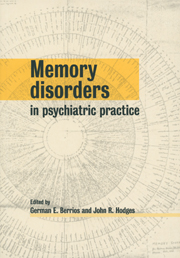2 - Mood and memory
from Part I
Published online by Cambridge University Press: 06 January 2010
Summary
Mood disordered individuals who present at the clinic invariably complain of day-to-day problems with basic cognitive processes, particularly memory and concentration (Watts & Sharrock, 1985). The question for the clinician is whether these complaints reflect objective impairments in cognitive processes or whether they are merely a function of a self-report style biased towards the presentation of problems and difficulties.
Resolution of this question has important implications for assessment and treatment. Accurate knowledge about the types and degrees of cognitive impairment that can be attributed to the individual's mood disorder across a range of processes is often an important component in differential diagnosis, for example, between depression and senile dementia of the Alzheimer's type (SDAT) (e.g. Cummings, 1989). Furthermore, a number of intervention packages have been developed for problems with basic processes such as memory and concentration (e.g. Fogler & Stern, 1987), and the application of these to the mood disorders is dependent on a thorough understanding of the problems with which such individuals are grappling. Finally, a number of the talking therapies such as Cognitive Behaviour Therapy (e.g. Beck, 1976) involve large memory components both in the generation of material to work with in the therapeutic session and prospectively for remembering to carry out homework assignments.
Although the topic of mood and memory is a broad one, in terms of pragmatic clinical implications it can be narrowed down to the effect of negative mood states on memory performance. What is more, memory difficulties seem to be more clearly a problem for depressed individuals than for those presenting with anxiety disorders. Consequently, the prime focus of the present chapter will be on memory and depression.
Keywords
- Type
- Chapter
- Information
- Memory Disorders in Psychiatric Practice , pp. 34 - 46Publisher: Cambridge University PressPrint publication year: 2000
- 5
- Cited by

